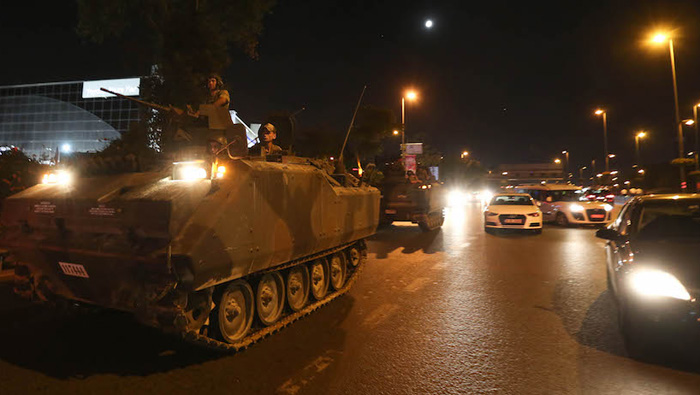NOAH BLASER
lmost nobody saw it coming, but on Friday night swarms of tanks and troops rolled into major cities throughout Turkey, locking down roads, government installations, and major thoroughfares. Their goal was nothing less than the toppling of President Recep Tayyip Erdogan, and launching the fourth successful military coup in the country’s history.
Military officials announced through loudspeakers that a curfew had taken effect throughout the nation, while news reports suggested a dissident group within the military had taken Turkey’s general chief of staff hostage.
International flights were cancelled and social media slowed to a standstill. A warplane reportedly struck the seat of Turkey’s parliament before being shot down, while troops stormed the headquarters of Turkey’s state broadcaster.
But Erdogan, on vacation in southern Turkey, remained out of the hands of the military putsch, suggesting that the coup has so far failed to decisively topple his decade-plus rule over Turkish politics.
“All involved in this will pay the highest price,” Erdogan told CNN Turk, where he spoke via a news presenter’s cellphone. “I am calling on our nation. Go to squares, let us give them the best answer.”
The attempt comes as Erdogan moves to constitutionally boost his presidential powers in what critics describe as a democracy-destroying maneuver. But on Friday, the country’s three largest opposition parties nonetheless called on supporters to oppose the coup, so bitter is the legacy of military rule in Turkey.
As rumor of a coup swirled across social media early on Friday night, thousands crowded into buses and taxis to rush home in Istanbul, only to find roads blocked by a patchwork of police and military checkpoints. In Istanbul’s central Taksim Square, soldiers and police loyal to the government engaged in a tense standoff.
After police fired teargas into a group of pro-coup protesters entering the square, soldiers pushed police into a retreat by firing sporadically into the air. Demonstrators stood around a statue of Turkey’s secular founder, Kemal Ataturk, as they chanted calls for Erdogan’s resignation.
“Turkey has been polarized and brought to the brink of war by one man, Erdogan,” said Halil Aktas, a protester who had taken to the square. “This will not continue a single day more.”
But the wider scene suggested that the coup attempt, no matter its outcome, was sure to dramatically increase social divisions in Turkey that have grown over the strongman legacy of Erdogan and his government.
As protesters called for the government’s ouster in Taksim, hundreds took to the streets of the nearby district of Kasimpasa, Erdogan’s blue-collar birthplace. “Erdogan is the honor of Turkey!” shouted protesters near a military checkpoint. “Revenge! We will take our revenge!”
Trapped between opposing protests, residents on one central Istanbul street crowded into local corner stores to stock up on water and food.
“I am trembling more every second we stand here,” said Ayca Tezcan, a shopkeeper handing out pasta and bottled water to a line of six impatient locals. “Why is my husband insisting we stay open? Terrible things could erupt any moment, what is money worth if you don’t have safety?”
Initial reports suggested a cadre of dissident officers had launched the coup. That would mirror Turkey’s coup in 1960, when a cadre of dissident junior officers overthrew Prime Minister Adnan Menderes, a populist whose decade-long rule became characterized for is undemocratic excesses. Menderes’s execution after the coup in 1961 is often cited by Erdogan as a reminder of dark forces that allegedly threaten his rule.
Erdogan’s ambitions for an all-powerful presidency, coupled with a plummeting record on press freedom and tolerance of dissent have stoked fury in Turkey’s in secular circles for years.
But the coup may end up emboldening, rather than tempering, the president’s drive to enhance his powers. A failed coup could easily broaden Erdogan’s support for a sweeping, controversial boost of his governing powers by validating his allegations that shadowy powers were attempting to undermine his rule.
On social media, anti-coup protesters seemed to roll back the military from scores of checkpoints in the late hours of Friday, while the spokesman for Turkey’s spy agency, the National Intelligence Organization (MIT), declared that the coup had been “repelled.”
Yet the motivations for a military coup remain unclear. Turkey’s government and military have appeared ever-closer allies in recent years. In 2014, a Turkish court released scores of senior military officials jailed in the Ergenekon coup plot trial, a case which formerly helped Erdogan’s ruling Justice and Development Party (AKP) reign in the power of the military. And earlier this year, Turkey’s Supreme Court of Appeals overturned all convictions in the Ergenekon case, ruling that the alleged shadowy network never existed at all.
Since mid-2015, Ankara has given the military official free reign to combat Kurdish militants in the southeast, and recently passed a law granting soldiers greater immunity from legal prosecution amid accusations of security force rights violations during military operations in the country’s majority Kurdish southeast.
Most recently, Turkey’s government has moved to normalize relations with Russia, Israel, while making overtures to improve ties with the Syrian regime, all steps seen to fit the Turkish military’s own cautious geopolitical preferences.
If the coup is successful, it is hard to imagine that it will decrease the significant dangers faced by Turkey, which include a growing threat posed by the Islamic State. At the very least, the ouster of a moderately Islamist government by a secular military force will be ready-made propaganda for radical Islamic extremists in Turkey.
Nor would a coup decisively end a revived Kurdish insurgency, which has claimed over 1,700 lives since July 2015 according to the International Crisis Group.
Whoever prevails in the aftermath of the coup, the agenda is likely to be governed by revenge and narrow power seeking. In the sudden battle for the fate of Turkish democracy, one side is sure to win. But Turkey’s democracy is sure to lose.







Comments